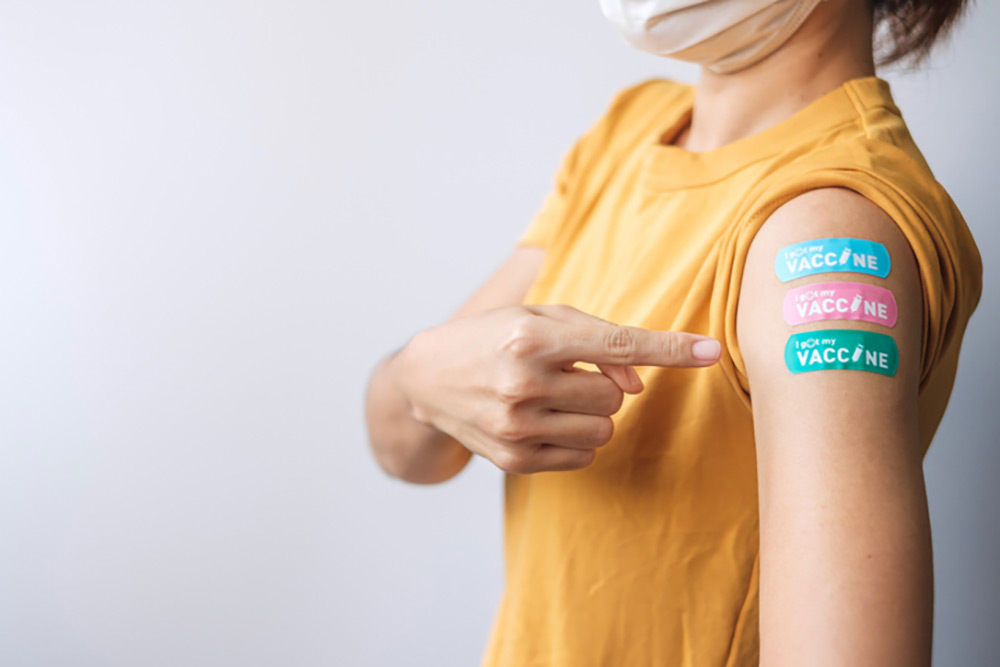
iStock
By Mary Carpenter
COVID fatigue—that ranges from disinterest to numbness—at any reference to the virus comes in part from many people believing they are personally well protected, bolstered by recently announced plans to relax Covid quarantine requirements. In addition, along with the similarity of the new requirements to those for RSV (respiratory syncytial virus) and flu, is the most-recent Covid vaccine’s design as the same kind of once yearly shot as the annual flu vaccine.
Covid test positivity and hospital admission rates, however, are rising and falling around the country—with many urban medical centers now requiring their personnel to wear masks. And Covid research continues to produce new findings —such as a recent German study showing that giving vaccinations and boosters in the same arm offers better protection, according to WebMd. Explained Vanderbilt University infectious disease specialist Willian Schaffner, “Same arm vaccinations may work better because cells that provide the immune response are in local lymph nodes.” And people who received the “updated” Covid vaccine targeting the Omicron variant, available since last September, at least four months ago are now eligible for a booster.
“COVID-19 vaccines [including the new one] are most effective during the first three months after vaccination,” according to JohnsHopkinsMedicine. With earlier Covid vaccines, protection against symptomatic Covid fell off every month following vaccination. On the other hand, the site describes the 2023–2024 vaccine as a “one-shot vaccine for most people, and there is no booster this season. (People who are immunocompromised or ages 6 months to 4 years may need more than one 2023–2024 vaccine.)”
With the announcement of reduced quarantine time following Covid infection, “concerns among medically vulnerable people are growing,” according to the Washington Post. Critics say “Covid should not be treated like other respiratory viruses, because it currently hospitalizes and kills more people than flu and can inflict long-term complications.”
Supporters note, however, that “the threat of severe illness has dimmed as a result of vaccination, prior infections and antiviral treatment.” According to the new recommendations, “people could return to school and work if they have been fever-free for at least 24 hours without the aid of medication, and they have mild and improving symptoms.”
The greatest Covid-related worry for many is the risk of lasting symptoms, notably fatigue or PEM (post-exercise malaise). In a Senate hearing last month described by New York Times columnist Zeynep Tufekci, Kansas Senator John Marshall said in a voice “shaking with emotion…‘We’ve taken my loved one to dozens of doctors…I’ve talked to 40,50,60, 80…read everything there is to read about long Covid, talked to other members of the Senate that have had long Covid. What are they doing?’”
“For years, long Covid clinicians hoped for hard information about seemingly promising drugs, including those that are already being prescribed off-label,” writes Tufekci. “I previously brought low-dose naltrexone up to N.I.H. officials as an example of an existing drug they could be testing. They told me that trials for drugs already on the market were imminent. That was 18 months ago.”
“A sea of blue T-shirts reading ‘Long Covid Moonshot,’ the name of a patient campaign calling for at least $1 billion a year for long Covid research,” is how Tufekci described the Senate hearing room during Marshall’s speech. Tufekci wrote about the N.I.H. allocation of about $3 billion annually to H.I.V., for which there is “an effective treatment and affects about 1.2 million people in the U.S.” —versus about nine million people for long Covid, as of the recent 2022 National Health Interview Survey.
Having avoided Covid infection so far, I try to wear a mask in crowded closed spaces, notably theaters and airplanes, but am uncomfortable doing so at festive gatherings where no one else is wearing one. I would feel safer knowing that infected people were quarantining long enough to no longer be contagious. At the same time, I understand Covid fatigue as well as the longing for life before the pandemic.
—Mary Carpenter regularly reports on topical subjects in health and medicine.
